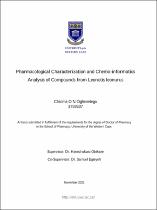| dc.description.abstract | The central nervous system (CNS), consisting of the brain and the spinal cord, is responsible for
integrating sensory information and influencing most bodily functions . The CNS is protected from
toxic and pathogenic agents in the blood by permeability barrier mechanisms. These barrier
mechanisms, specifically the blood brain barrier (BBB) presents a challenge for the discovery of
CNS active drugs as it is requirement for these drugs to permeate the BBB to reach their target site
in the CNS. The conventional processes of drug design and discovery from natural products are
time consuming, tedious, expensive and have a high failure rate. It has been reported from various
studies that the use of computational modelling and simulations in drug design and discovery is less
costly and less time-consuming with a greater chance of success than the conventional processes.
The process of drug discovery and design can, therefore, be easily carried out using proven
computer models, software, and web-based tools . | en_US |

